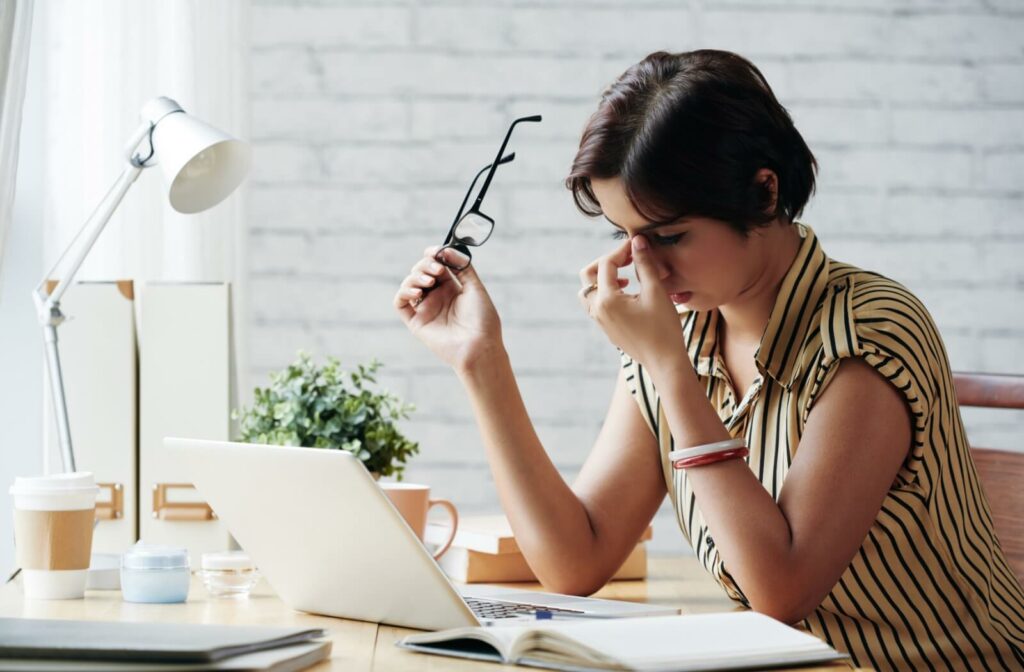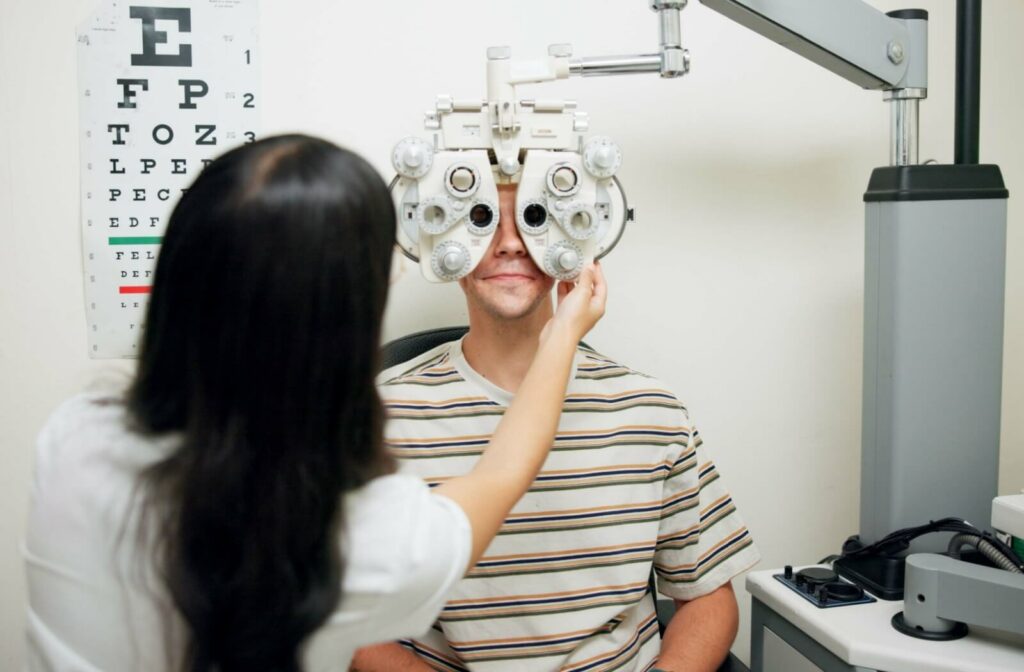When your optometrist hands you your first pair of glasses, it can feel like a moment of transformation. Suddenly, the world sharpens into focus. But one common misconception that sometimes spoils the beauty of this moment is that glasses weaken your eyes. This isn’t true, though. Glasses do not make your eyesight worse—they do the opposite.
Prescription glasses are designed to improve your vision when a refractive error is causing you to struggle with distance or near vision. If you’ve had glasses for a while and your vision isn’t what it was, it’s worth booking an appointment with your eye doctor. Your vision can change over time, but not because of your glasses.
How Do Glasses Work?
If you have a refractive error, the light entering your eyes doesn’t focus properly on your retina, leading to blurry vision at various distances. Glasses lenses alter the angle at which light enters your eye, compensating for the refractive error and improving clarity.
Glasses don’t change your eyes physically. Instead, they work externally to adjust how light interacts with your retina.
The Most Common Refractive Errors
Before we dig deeper, it helps to understand the common issues glasses correct:
- Nearsightedness (myopia): Objects up close appear sharp, but distant objects are blurry
- Farsightedness (hyperopia): Distant objects appear sharp, but near objects are blurry
- Astigmatism: Light is spread unevenly across the retina, leading to distorted or blurry vision
- Presbyopia: Age-related loss of the lens’s ability to focus on near objects, common after age 40
Each condition is corrected with lenses tailored to your eye’s unique needs.
Do Glasses Make Your Vision Worse?
The simple answer: No, glasses do not make your eyesight worse.
Glasses correct your vision while you wear them, but they don’t alter underlying anatomy or otherwise cause your eyes to weaken. However, you may notice that your vision feels blurrier when you remove your glasses than it did before you started wearing them. This sensation has more to do with adaptation than actual vision changes.
Why Does This Misconception Exist?
Several factors contribute to the myth that glasses weaken your eyes. Understanding these factors can help put your mind at ease.
Natural Vision Changes
Eyesight naturally changes over time, especially as a person ages. Presbyopia, for example, is a natural part of aging. When changes happen while wearing glasses, it’s easy to assume the glasses are to blame—but they simply coincide with what the eyes naturally experience.
Incorrect Prescriptions
Wearing the wrong prescription can cause eye strain, headaches, and blurred vision. But this doesn’t mean that glasses damage your eyesight. It simply underscores the importance of regular eye exams to ensure your prescription is accurate.
Screen Time & Digital Eye Strain
With people spending more time on digital screens, issues like digital eye strain (or computer vision syndrome) have become more common. Eye strain can cause temporary discomfort, blurriness, and fatigue—but your glasses aren’t the cause. Instead, eye strain is the result of prolonged focus.

A Change in Vision Expectations
After wearing glasses, your eyes adapt to seeing the world with perfect clarity. When you remove your glasses, your uncorrected vision may feel weaker in comparison, even though it hasn’t actually changed. This change is a matter of perception, not eye health.
The Role of Regular Eye Exams
One of the best ways to maintain healthy vision is by scheduling regular eye exams with your optometrist. Eye exams ensure your prescription stays current and can detect early signs of eye conditions like glaucoma or macular degeneration.
An eye exam typically involves:
- Checking your visual acuity (how well you see)
- Testing for refractive errors and determining your prescription
- Screening for eye diseases or abnormalities
Lifestyle Tips for Maintaining Good Eye Health
Beyond wearing glasses, incorporating these habits into your routine can help safeguard your eyesight.
Practice the 20-20-20 Rule
If you spend hours on screens, follow this simple rule to reduce digital eye strain. Every 20 minutes, look at something 20 feet away for 20 seconds. It’s a small habit that makes a big difference.
Protect Your Eyes from UV Light
Wear sunglasses that block 100% of UVA and UVB rays outdoors. Ultraviolet light can increase the risk of cataracts and other eye conditions.
Eat for Your Eyes
A diet rich in vitamins A, C, and E and omega-3 fatty acids is great for eye health. Carrots, salmon, leafy greens, and citrus fruits are excellent choices.
Keep Hydrated
Dry eyes can cause discomfort and blurred vision. Drink plenty of water and consider using lubricating eye drops if you frequently experience dryness.
Take Breaks from Screens
Too much screen time isn’t ideal, whether at work or relaxing. Incorporate regular breaks to rest your eyes and maintain focus.
Support Your Vision with the Right Prescription
An accurate prescription enhances comfort and optimizes daily activities, from reading and driving to working on a computer.
If you’ve been postponing an eye exam or feel that your current glasses aren’t working as well as they used to, now’s the time to connect with your eye doctor and book an appointment. At Total Focus Optometry, we’re committed to helping you achieve exceptional vision through personalized care and the latest eyewear selections.




